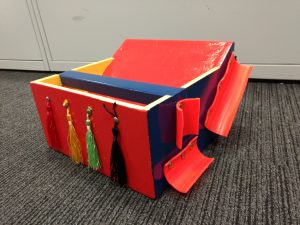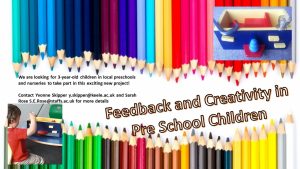We have a number of projects currently running in local nurseries and pre schools. In the summer of 2018 we will be running projects in our Lab at Staffordshire University again.
Assessing Creativity in Young Children
We are working to develop new measures of creativity that can be used with young children. This project involves a member of our research team visiting children in their nurseries on two separate occasions a week apart. During each visit children spend approximately 15 minutes with our researcher taking part in play based activities. Some of these are established measures of creativity and some are measures that we are developing. We are interested in how each child performs on the established measures  compared to the new measures. If their performance is very similar it suggests that the new measures are also good assessments of creativity. We need more measures so that the impact of other activities (e.g. screen time, engaging with digital technology, book reading, free play etc…) on young children’s creativity can be investigated.
compared to the new measures. If their performance is very similar it suggests that the new measures are also good assessments of creativity. We need more measures so that the impact of other activities (e.g. screen time, engaging with digital technology, book reading, free play etc…) on young children’s creativity can be investigated.
The Impact of Feedback on Young Children’s Creativity
There is a growing body of evidence suggesting that praising an individual’s
efforts and techniques (e.g. you are working really hard) rather than an individual’s
ability (e.g. you are really good at this) has positive outcomes. There is also
increasing interest in how creativity can be encouraged among young children but
it is unclear what specific approaches, or features of the environment, promote
creativity in preschool children. Therefore, the proposed project aims to
investigate the extent to which praise focusing on effort compared to praise
focusing on ability may influence creativity.
Ninety 3-year-old children will complete a play based test of creativity (Unusual
Box Task: Bijvoet-van den Berg & Hoicka, 2014) while receiving either praise
focusing on their efforts, their ability or generic praise (not focusing on efforts or
ability). The child’s play will be coded to assess the number and uniqueness of
their creative ideas and comparisons will be made to see if, and at what point,
these are influenced by the type of feedback being received.

